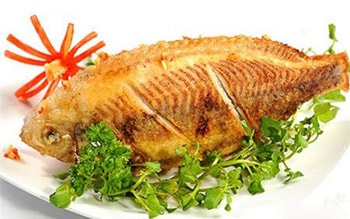Things to keep in mind when eating fish
Fish is a very healthy food because it is rich in nutrients and easy to digest. However, if you eat fish incorrectly, it can have the opposite effect, which is harmful to your health.
Here are some things you need to know when eating fish:
1. Frozen fish has the same nutritional value as fresh fish.
Many types of fish are frozen on board the boat and then transported to the mainland after a short time. If the freezing time is not too long, the fish will still have the same nutritional value as fresh fish after thawing.
2. Fish is beneficial to health mainly due to the omega-3 fatty acids found in fish.
Most fish contain omega-3 fatty acids, especially salmon, mackerel and herring... This fatty acid is a precursor of DHA and helps cells in the human body function well. Omega-3 fatty acids are especially good for the brain, skin, cardiovascular disease, blood pressure, reducing the risk of diabetes, weight loss and asthma attacks, reducing symptoms of rheumatoid arthritis, fighting depression...
Since our bodies do not have enough of these essential acids, we must get them from food, preferably from fish.
3. Fish can be infected with worms.
Like many wild animals, birds and fish can eat tapeworm eggs that are abundant in the environment. When entering the animal's body, tapeworm eggs develop into larvae, cysts and reside in the animal's internal organs. Freshwater fish are at higher risk. One of the parasites that fish can be infected with is tapeworm.
If not destroyed, this parasite can infect the human body and reside in the human intestines for many years, growing to 1-2m in length and causing excruciating pain, weight loss and anemia.
4. Eating fish regularly will reduce the risk of heart disease and stroke.
Omega-3 fatty acids in fish have anti-inflammatory properties that can reduce the risk of chronic inflammatory diseases by up to 52%, thereby contributing to reducing the risk of high blood pressure, stroke... It also helps lower blood pressure, reduce irregular heartbeats and reduce the risk of heart disease by up to 36%.

Illustration photo
However, if you do not know how to eat fish, you may encounter health risks. Therefore, when eating fish, you need to remember the following:
1. Do not eat fish when hungry
Eating fish on an empty stomach can increase the amount of purine converted into uric acid, which can cause tissue damage. Tissue damage is the cause of gout. Therefore, to avoid the risk of gout, you should not eat fish on an empty stomach.
2. Do not eat raw fish
Many people have said that the fresher the fish, the better and that raw fish is the most nutritious. But in fact, this is a completely wrong concept. Raw fish often contains parasites and if not cooked, the parasites cannot be destroyed. If you eat raw fish, these parasites will enter the body, causing harm to the liver, causing the liver to be infected with parasites, and in severe cases, even leading to liver cancer.
3. Do not eat fish gall
According to many Oriental medicine doctors, fish bile after being processed into medicine can be used to make medicine to cure diseases, for example, to treat sore eyes, red eyes, sore throat, malignant ulcers...
However, in reality, this is extremely dangerous. Eating fish gallbladder can easily cause poisoning and even endanger life, especially the gallbladder of grass carp and common carp. Fish gallbladder often contains tetrodotoxin. This substance is considered to have harmful effects on the nervous system, causing fatigue, respiratory failure, and behavioral disorders. Therefore, when preparing food, it is necessary to wash it thoroughly, cook it well, and it is best to remove the gallbladder and fish intestines.
According to Young Intellectuals - PC
